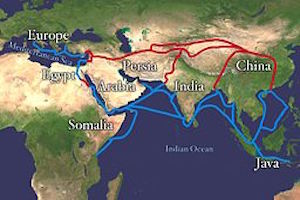The Belt and Road Initiative and China's Xinjiang Dilemma: “Connectivity” Versus Control?
By Michael Clarke
July 20, 2017, the CACI Analyst
President Xi Jinping’s ambitious “Belt and Road Initiative” (BRI) seeks to make China the hub of trans-Eurasian economic connectivity by linking the Chinese economy with the major continental and maritime zones of the Eurasian continent through both physical and financial infrastructure. President Xi has proclaimed that BRI will “benefit people across the whole world” as it will be based on the “Silk Road spirit” of “peace and cooperation, openness and inclusiveness”. This rhetoric may be enhancing Beijing’s diplomatic position but it is one that rings hollow in China’s own Eurasian frontiers such as Xinjiang where BRI is coinciding with the imposition of new forms of political and social control.

EU–China trade to bolster security in the South Caucasus
By Boris Ajeganov
January 23, 2017, the CACI Analyst
Foreign investment in Georgia is strengthening the country’s importance in connecting East Asia with Europe, which has positive implications for the broader region. The rise in FDI in commercial and transportation infrastructure in combination with the signing of international free trade agreements will reduce Georgia’s vulnerability in terms of economic and, ultimately, ‘hard’ security. The growing importance of the South Caucasus as node for EU-China trade will weaken Russia’s incentives to undermine its southern neighbors by military, political, and economic means as it has done in the past. Accordingly, Tbilisi’s ability to conduct an independent foreign policy is set to improve despite the absence of Western security guarantees.
Putin-Xi meeting underlines Russian weakness faced with China's geoeconomics strategy
By Robert M. Cutler
August 28th, 2016, The CACI Analyst
On June 25, Presidents Vladimir Putin of Russia and Xi Jinping of China met in Beijing, immediately after spending two days together in Tashkent at a summit meeting of the Shanghai Cooperation Organization (SCO). The two countries’ industrial cooperation is dominated by the energy sector, where the several dozen agreements that were signed in Beijing confirmed that in bilateral economic and trade relations China is the agenda-maker and Russia is the agenda-taker. This relationship is now extending itself to the geoeconomic competition between the two in Central Asia and East Central Eurasia generally, as well as into Greater South Asia at a slower pace.
Central Asia, the AIIB and the advent of 5G communication
By Kairat Bekov and Gregory Gleason
April 1st, 2016, The CACI Analyst
Competition over technological advantage has replaced rivalry over territorial advantage in the great games of contemporary Central Asia. One of the main thoroughfares of the modern “Silk Road” is the telecommunications highway. The impending advent of fifth generation telephone technology is opening yet a new sphere of interaction among the countries of Central Asia offering as many opportunities for regional cooperation as it creates for competition.
Kazakhstan's revival of the Silk Road Initiative: the challenges ahead
By Rafis Abazov
October 8th, 2015, The CACI Analyst
During his recent visit to China, Kazakhstan’s President Nursultan Nazarbayev signed a series of trade agreements and Memorandums of Understanding (MOUs) on 48 projects valued at about US$ 30 billion. The Minister of Economic Affairs, Yerbolat Dosayev, has called the Chinese market one of the “main markets for Kazakhstan.” The Kazakh government also reiterated its support for the Beijing-instigated “Silk Road Economic Belt (SREB)” initiative and agreed to continue working on several large infrastructure projects. But opinions of Kazakh experts on the SREB are divided. Some believe China’s financial backing will strengthen trade and lead to economic growth, but others are skeptical, claiming it would conflict with the U.S.´s “New Silk Road” initiative.






